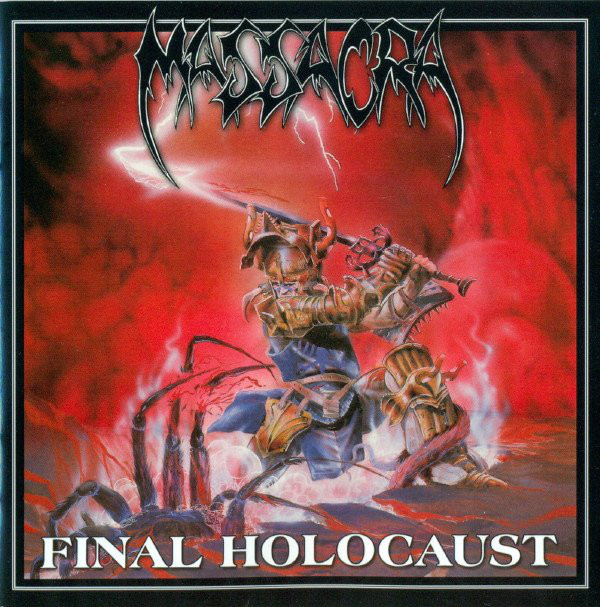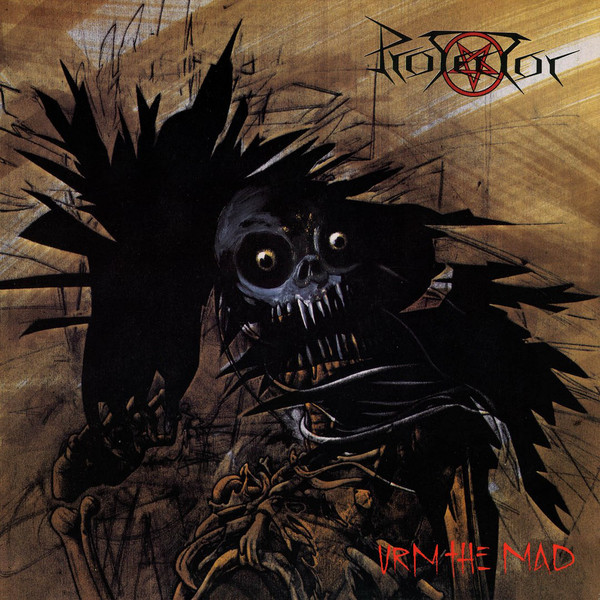Death thrash? Thrash death? Even my pedantry has its limits. If we’re talking in terms of pure extremity, then these artists exist at the borders of thrash, at least philosophically if not in actual output. There’s no quirky dissonance, the drums are sticking with straightforward bursts of energy that rely on their relentlessness over anything too complex, and there’s not much in the way of melodic hooks to sink your teeth into. There is only a tessellation of frantic riffs, tripping over each in their rush to pull each track in competing directions. It feels like death metal because it is the logical conclusion of thrash as the pursuit of extremity in various guises: speed, aggression, chaos, energy. A sit down with some non-metal music theory would be required to take this music beyond this terminus of genre. If the story of thrash started in America, it would end in Europe with acts like this, before death metal took up the mantel and changed the face of metal yet again.
France’s Massacra are possibly one of the most underrated bands of this era. Maybe it’s all the Frenchness, or lack thereof given that France is not the first place that comes to mind when discussing late 80s thrash metal. Their first LP ‘Final Holocaust’ released in 1990 is a fitting way to close off the story of the previous decade. The direct heir of Teutonic thrash, at first glance this could be considered a mere juiced-up version of their German counterparts. But appearances can be deceiving. Massacra take the riffsalad philosophy to a whole new level on this album. On the one hand we could view it as an over excited puppy jumping from one activity to the next with no structure and absolutely no patience for seeing an idea through to its fruition. But it is in this frantic energy that ‘Final Holocaust’ really pays its rent.

Once one has grown accustomed to the exhilaration and seemingly limitless energy found on this album, it becomes a useful instruction manual for what metal was doing at the time in terms of riff mapping. As a demonstration of this, pick any track at random on ‘Final Holocaust’ and give each riff an algebraic designation; you could also use a sub label like A* for minor variations and reiterations of the same refrain (or you could get laid). Once the schematic is complete, give the track a few more spins. As the piece unfolds you will notice the rudiments of a story or logical timeline build up. On repeated listens it becomes easier – and more fulfilling – to follow this story through, as each riff that blasts by is understood not as just another random element chucked in because it sounds cool, but functions as a cog in a greater machine. For this reason as well, variations in timbre and dynamics are only secondary for this form of narrative composition, because it trades solely on the internal logic of each connection and their culmination in the arc of the final piece.
The choice to focus entirely on connecting up these micro ideas into a larger structure is reflected in the overall presentation of this album; despite the obvious limitations of the mix. The guitars are placed front and centre, with two clearly distinctive tracks which – for the most part – play in unison, keeping counterpoint to a minimum. Even solos are somewhat suppressed in favour of rhythm guitar, used simply to accent moments of heightened drama and chaos with amelodic fretboard murder replacing a distinctive hook. Drums are clear and distinct, offering a tight, energetic and varied backing to the real stars of the show. They follow the activities of the guitars to the letter. Every shuffle and rhythmic fidget, every lick to sign off one riff into the next is mirrored in a drum fill or accent. This leaves the vocals alone as the only other element that remains somewhat free of the dictates of the guitars, offering monstrous declarations of chaos and war in primitive staccato form, revelling in the ever-shifting foundation of this restless whirlwind of colliding narratives.
Germany’s Protector, although contemporaries of Massacra, heil from a stylistically earlier lineage. Their debut LP ‘Golem’ (1988) is another one of those albums that purports to be a full stop on the whole thrash project in terms of raw extremity, along with the likes of Sadus and Pestilence. With less fanfare yet more talking points was their follow up, 1989’s ‘Urm the Mad’. ‘Thrash doom’ isn’t exactly a thing, but if it was then ‘Urm the Mad’ could make a strong claim to be its genesis. The overall energy and impetus is somewhat sleepier than the debut. The focus seems to be on creating a darker vibe, a more immersive if less intense statement. The faster thrash passages are fewer and further between, and come across as lip service more than musicians playing for the simple joy of it. The impression is that Protector wanted to create a mid-paced, heavy, dark piece of extreme metal that trades more in tone and layering up of different elements rather than a blasting smack in the face that was the stock-in-trade at the time.

The production speaks to this, with a weaker but deeper guitar tone. The inertia created by the additional reverb tends to murk up with faster passages, but is ideally suited to the modest doom breakdowns that frequently crop up throughout. Solos, rather than heightening the tension and intensity seem designed to give size and weight to the mix, with the pitch often sinking lower than the rhythm guitar and filling out the void with reverb and feedback. The drums are perhaps the weakest elements to the mix. There is no power or depth, and despite Michael Hasse’s serviceable performance, they are relegated to a simple metronome for the majority of the album, with none of the fills landing and the whole dissolving into a weak rhythmic static when the thrash gets going. Martin Missy’s vocals by contrast have gone full death metal, offering the full range of pitch and strength with barks and screeches covered in reverb.
The guitars vary from run-of-the-mill thrash to epic death doom. The thrash riffs themselves are utterly rudimentary, sometimes made up of nothing more than a one beat shift between two notes. But far from being a detriment, this actually plays into the overall glum atmosphere of the album. Rather than contrasting with the droning chords and patiently unfolding doom of a track like ‘Nothing has Changed’, they actually reaffirm the overall ethos, just at a faster tempo. The dark undertones to this album also gives ‘Urm the Mad’ an early black metal vibe. The emptiness of the mix, the lack of colour and life despite the showcase of late 80s thrash, all lend it a dark quality that predicts some of the macabre tangents extreme metal was to take in the decade that followed.
Dropping these two albums on the scales will have to be done with a couple of caveats on either side. ‘Final Holocaust’ is a classic of death/thrash that to this internet-dominated day has still gone largely overlooked in favour of adoration for the same old shit. It is both instructive at a mechanical level and a joy to listen to, and easily holds up despite the obvious shortcomings placed on it by time and place. ‘Urm the Mad’ has many unexpectedly innovative qualities for a German thrash record that make it prima facie the more interesting release. But the elements in question are largely aesthetic, not deeply embedded within the album itself. The doom elements mixed with thrash is interesting, but neither one is ground-breaking or genre defining even for its day. The thrash riffs are largely so-so, as is the playing. But there is an underlying atmospheric quality that makes it at least noteworthy in the annuls of history. Noteworthy this week is sadly not enough to make it my pick however, which goes to the incomparable ‘Final Holocaust’.
I need to come visit this blog more often! Your content is amazing 🙂
LikeLike
Well done. Massacra! Shark records.
LikeLike